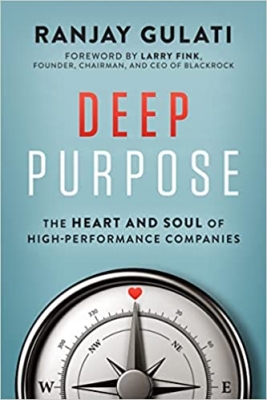New Delhi– A distinguished Harvard Business School professor offers a compelling reassessment and defence of purpose as a management ethos, documenting the vast performance gains and social benefits that become possible when firms manage to get their purpose right.
Few business topics have aroused more skepticism in recent years than the notion of corporate purpose, and for good reason. Too many companies deploy purpose, or a reason for being, as a promotional vehicle to make themselves feel virtuous and to look good to the outside world.
Some have only foggy ideas about what purpose is and conflate it with strategy and other concepts like ‘mission’, ‘vision’, and ‘values’. Even well-intentioned leaders don’t understand the full potential of purpose and engage half-heartedly and superficially with it. Outsiders spot this and become cynical about companies and the broader capitalist endeavour.
Having conducted extensive field research, Ranjay Gulati reveals the fatal mistakes leaders unwittingly make when attempting to implement a reason for being. Moreover, he shows how companies can embed purpose much more deeply than they currently do, delivering impressive performance benefits that reward customers, suppliers, employees, shareholders, and communities alike.
To get purpose right, leaders must fundamentally change not only how they execute it but also how they conceive of and relate to it. They must practice what Gulati calls deep purpose, furthering each organization’s reason for being more intensely, thoughtfully, and comprehensively than ever before.
In his authoritative work “Deep Purpose” (Penguin), Gulati takes readers inside some of the world’s most purposeful companies to understand the secrets to their successes. He explores how leaders can pursue purpose more deeply by navigating the inevitable trade-offs more deliberately and effectively to balance between short- and long-term value:
* Building purpose more systematically into every key organizational function to mobilize stakeholders and enhance performance
* Updating organizations to foster more autonomy and collaboration, which in turn allow individual employees to work more purposefully
* Using powerful storytelling to communicate a reason for being, arousing emotions and building a community of inspired and committed stakeholders; and
* Building cultures that don’t merely support purpose, but also allow employees to link the corporate purpose to their own personal reasons for being.
As Gulati argues, a deeper engagement with purpose holds the key not merely to the well-being of individual companies but also to humanity’s future. With capitalism under siege and relatively low levels of trust in business, purpose can serve as a radically new operating system for the enterprise, enhancing performance while also delivering meaningful benefits to society. It’s the kind of inspired thinking that businesses — and the rest of us — urgently need.
Ranjay Gulati is the Paul R. Lawrence MBA Class of 1942 Professor and the former Unit Head of the Organizational Behavior Unit at Harvard Business School. Until recently, he chaired the Advanced Management Program, the flagship senior leader executive program, at the school.
Gulati studies how “resilient” organisations — those that prosper both in good times and bad — drive growth and profitability. His work bridges strategy (establishing clear strategic pillars for growth), organizational design (re-imagining purposeful and collaborative organizational systems), and leadership (fostering inspired, courageous and caring execution).
He is the author of a number of books, and has been a frequent guest on CNBC and other media outlets. He has also served on the advisory boards of several entrepreneurial ventures.
Gulati holds a Ph.D. from Harvard University, a Master’s Degree in Management from MIT’s Sloan School of Management, and two Bachelor’s Degrees, in Computer Science and Economics, from Washington State University and St. Stephen’s College, New Delhi, respectively. (IANS)














